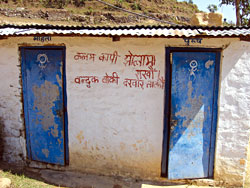|
|
| WRITING ON THE WALL: Maoist slogan on the wall of a school latrine in Kaski urging students to put their pens and books in their bags and march on the palace. |
But that's not the only controversial move that some of them have been making. Activists give speeches during Maoist assemblies, participate in the rebels' annual celebrations, help to bargain for 'donations', carry mobile SIM cards for Maoist leaders and even carry messages between rebels. These are serious mistakes.
Three months ago, the Maoists made rights workers from INSEC agree to their release of an abductee on the condition that he would pay local farmers the cost of crops. "If we stay witness to rebel demands, carry messages for them or ride army helicopters, then we can't call ourselves rights workers," says activist Sushil Lakhe from Advocacy Forum.
The problem is made worse by the booming human rights business. In the last five years, the number of rights NGOs has grown five-fold. "There are also so many so-called activists who don't even have minimum knowledge of humanitarian and human rights laws," says rights activist Bhola Mahat.
Nepalganj has a higher concentration of human rights workers than elsewhere in the country. Besides the mushrooming local NGOs, there are over a dozen national and international bodies, including the UN Office of the High Commission for Human Rights, the ICRC and the NHRC based here.
Problems arise when rights defenders in their blue jackets shout political slogans on the streets and call for all to participate in the democratic movement. The slogans themselves raise questions about their role as independent monitors. Such political bias means that they can never be as neutral as they are supposed to be.



